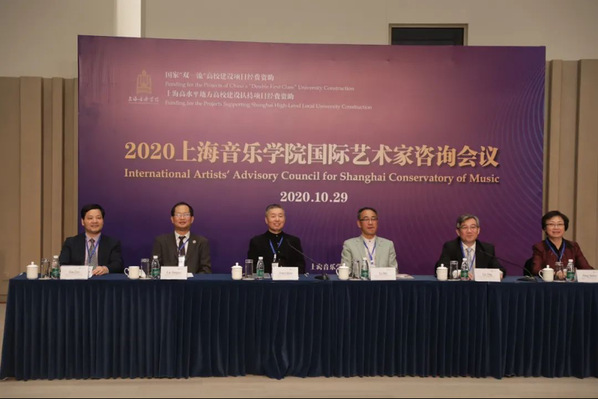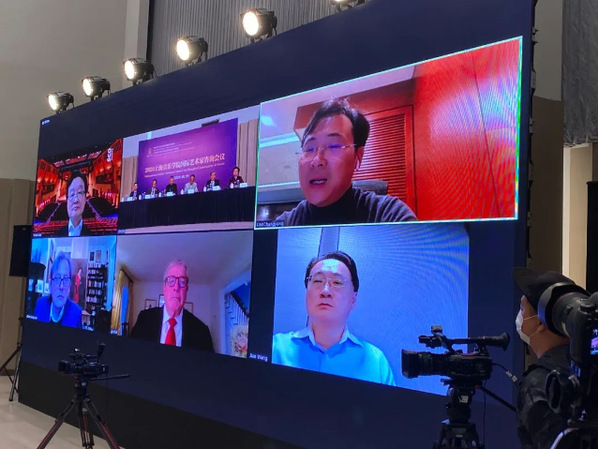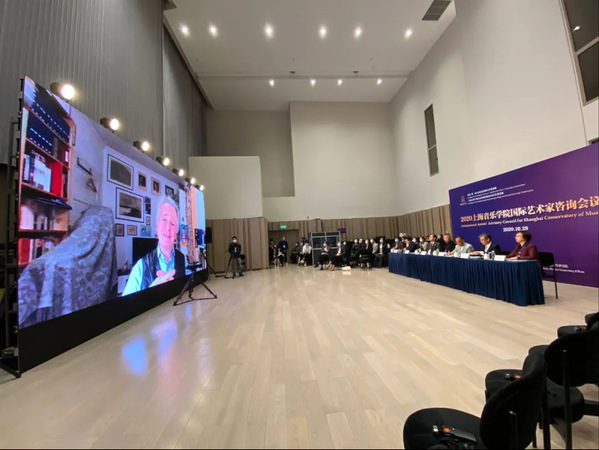
The 2nd International Artist Consultation Conference of the Shanghai Conservatory of Music was successfully held online as scheduled on October 29.
The conference invited a number of top experts and scholars from home and abroad in the field of music education and focused on the deep integration of information technology and music education in the “post-epidemic era”.
Zhao Jiping, famous composer and honorary president of the Chinese Musicians’ Association, sent a congratulatory video for the conference. President of SHCM Liao Changyong introduced the timely adjustments made by the conservatory in the face of the novel coronavirus outbreak.
SHCM has been advancing the integration of online and offline teaching. The conservatory launched the “cloud arts test” in China and created the “music on cloud” (“on cloud” means “online streaming”)network music brand. The conservatory will hold “cloud” symphony concerts, “cloud” graduation plays, “cloud” choruses, “cloud” tutoring, “cloud” healing, “cloud” rehearsals, etc.
In the future, SHCM will strengthen communication with its international counterparts so as to accelerate informatization and internationalization.

Liao hoped that SHCM can make more innovative breakthroughs by 2027, which is the centennial anniversary of the founding of the conservatory.
Joseph Polisi, President Emeritus and CEO of China Affairs of the Juilliard School, said that institutions nurturing artists should reexamine music itself and “change audiences and students with the power of music”, as well as review and plan the school curriculum system.
Ye Cong, music director of the Singapore Chinese Orchestra and conductor laureate of the Indiana South Bay Symphony Orchestra, discussed the post-pandemic new normal of teaching in music schools, and raised a series of questions such as the redesigning of curriculum and teaching materials, the integration of online and offline teaching, the updating of teaching methods and equipment, and the transformation of the teaching team.
The Vice Chairman of the International Artists’ Advisory Board and Hochschule für Musik und Theater Hamburg, Elmar Lampson, gave details about the application of digital technology at the Hochschule für Musik und Theater Hamburg. He said that in today’s fast-paced world of technological development, music schools should think more deeply about how to maintain their individuality and find the best balance between technology and art.

Hartmut Höll, principal of the Hochschule für Musik Karlsruhe, suggested that the COVID-19 epidemic has accelerated the development of the digitalization trend, and that as artificial intelligence technology develops, there will be many new possibilities for music schools to apply digital technology to teaching and talent development.
Wang Jian, renowned cellist and Royal Birmingham Conservatoire International Chair of Cello, expressed his views from the perspective of the artists themselves: The international community has entered a new era in 2020, in which the spread of music in society will rely more on technology.
Contemporary musicians should be demanding and use modern technology to promote their music career development. High-level music institutions that train artists should offer corresponding courses and provide positive guidance for students’ long-term career planning.
David H Stull, President of the San Francisco Conservatory of Music, thanked the Shanghai Conservatory of Music for accepting Chinese students from the San Francisco Conservatory of Music, the Manhattan School of Music, and the New England Conservatory of Music, who were unable to study abroad due to the epidemic, and for providing them with quality educational resources.

Famous composer and a distinguished alumnus of SHCM, Zhang Qianyi, who is also Vice Chairman of the Chinese Musicians’ Association and Chairman of the International Artist Advisory Committee of SHCM, said in his concluding remarks that the conference provided an open and inclusive platform to discuss how to adapt to changing times and cultivate outstanding musical talents amid the rapid development of information technology, which is of great significance to the future innovation and development of conservatories around the world.

